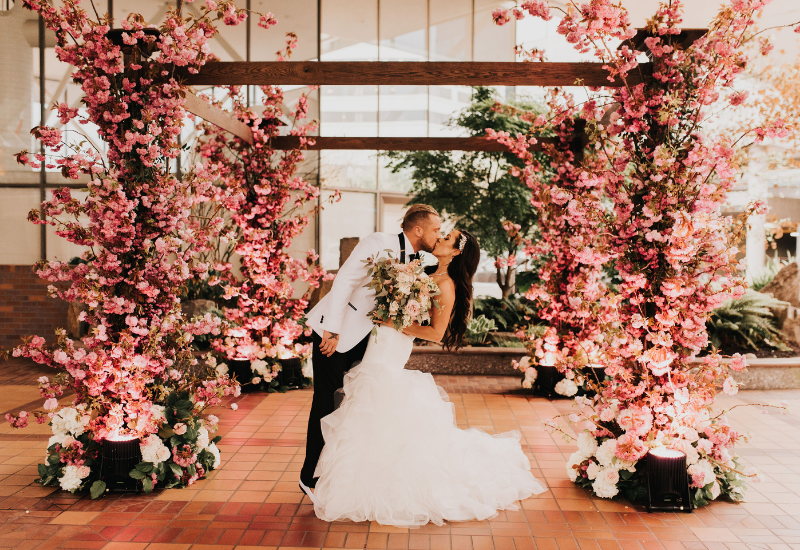
Seasonal and locally-grown blooms are gaining more relevance to consumers than ever before. Here's how florists can respond to consumer demand.
Earlier this year Slow Flowers Society sponsored two questions in the National Gardening Survey, conducted annually by the National Gardening Association and GardenResearch.com. The omnibus survey asks nearly 2,500 U.S. households a wide-ranging series of questions about garden buying habits and attitudes. Until this year the survey only included one question about household spending on cut flowers. I wanted to know what those consumers thought when it comes to local and domestic flowers. And as it turned out, the findings were encouraging:
These responses provide a new baseline metric against which future consumer attitudes will be compared. To me, they affirm what I've known anecdotally: Once consumers realize they have a choice about the source of the flowers they order or bring into their home, they are more likely to prefer locally-grown blooms.
Over the years, since the beginnings of the Slow Flowers Movement in 2012, I've had countless conversations with wedding and event florists, as well as retail and studio florists, about sourcing challenges. The prevailing question they pose is: Is it harder to buy from local flower growers?
The short answer is "it depends," and that's because each region is different, based on the number of farms that grow specialty cut flowers to supply wholesale floral buyers, as well as the climate and conditions of what types of flowers grow there.
Luckily, we have Slow Flowers Society members all across North American, including Alaska, Hawaii, and most Canadian provinces, so I asked a few experienced creatives to share their perspectives. Here are their stories and suggestions:
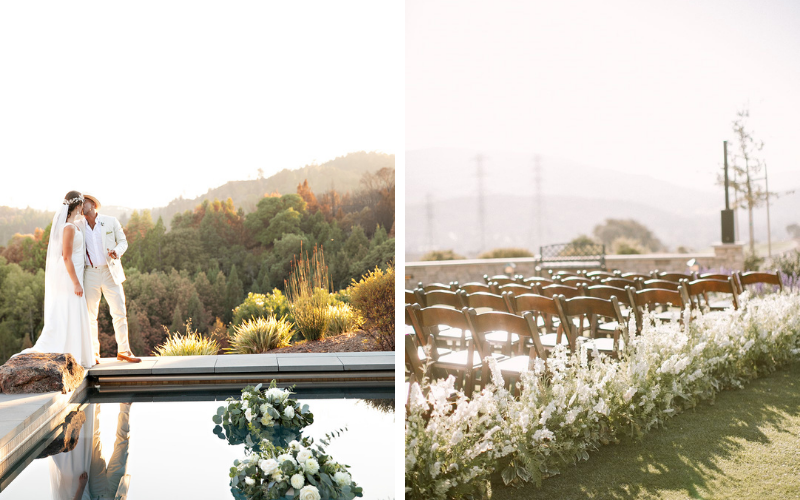
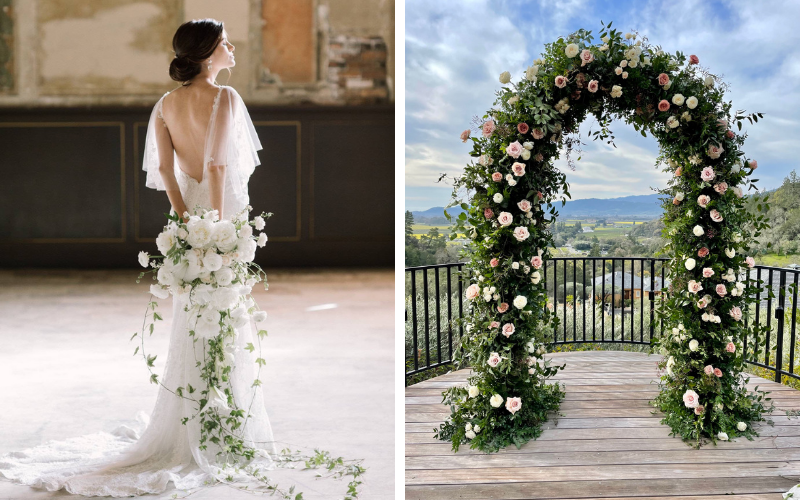
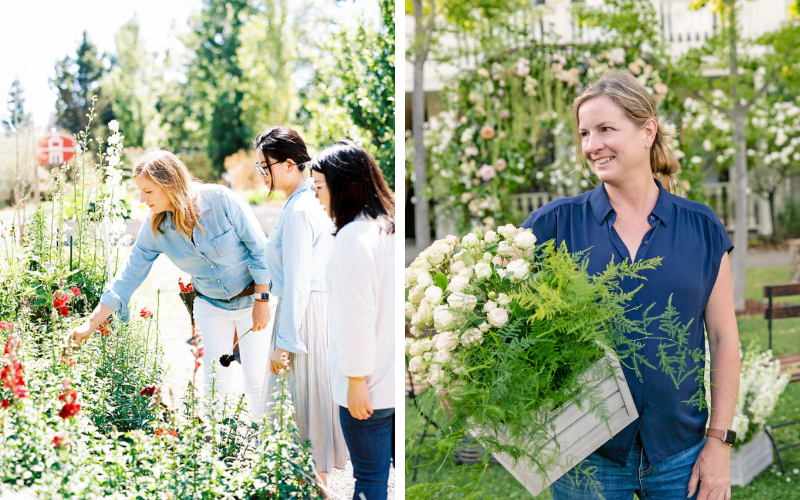
(Photo Credits Top Left to Bottom Right: Bride & Groom by Brooke Beasley Photography, Aisle Design by Ginner Silver of Retrospective Images, Big White Bouquet by Ginny Silver of Retrospective Images, Arch photo by Susan Stremlau, Workshop by Meg Sexton Photography, and Blue Tee by Justin Lee Photography)
A wedding and event florist based in Sonoma County, Susan Stremlau says California-based designers have nearly year-round access to local flower availability. Nearly five years ago, when she relocated from Silicon Valley to North Bay wine country, Susan rebranded her studio as Marion Moss Floral Design, with a deeper focus on growing. She turned her one-acre rural property into a micro flower farm in order to plant seeds and bulbs of the flowers she craved to design with. "I call myself a 'florist farmer' because right now, most of my income and most of my business is generated from weddings and events," she says. "This is really the first year where I've generated income from growing flowers that I sell to other designers, not just using them in my own designs."
She grows fragrant and delicate sweet peas, subtly-hued dahlias, garden roses like 'Distant Drums', lots of textural annuals, as well as hops vine -- all used to create her naturalistic bouquets and event florals. "I'm growing really special things that I know wedding florists want."
When Susan has more flowers than she can use, she lets other designers know what's available. "Local blooms are much better quality and they last longer. It might take a little bit more effort, but I really believe that the clients who value local flowers will pay more," she says.
Susan has become more involved with other flower growers in her region, so she understands how hard they work and how much they care about serving their floral design customers. "When you connect with a flower farmer, they want to hear what you want them to grow. You can tell a flower farmer about a beautiful variety of phlox or a particular color vignette you want. Or even buy them the seeds of the flowers you'd like to use. Create a relationship with the farmer who's growing special products that may be your competition doesn't have."
That said, Susan is careful to not over-promise her couples. She explains the vagaries of mother nature and that what she grows is a "couture" flower, not a "commodity" flower. "I usually specify in my proposal: 'Local, seasonal flowers in shades of white, ivory, blush and peach.' And then I'll say, 'Possible flowers may include . . . ' I know I could get a heatwave and all my sweet peas could die. A good grower will have a substitute, but if there's anything I have learned, it's that there are always disasters we can't anticipate."
Susan's advice:
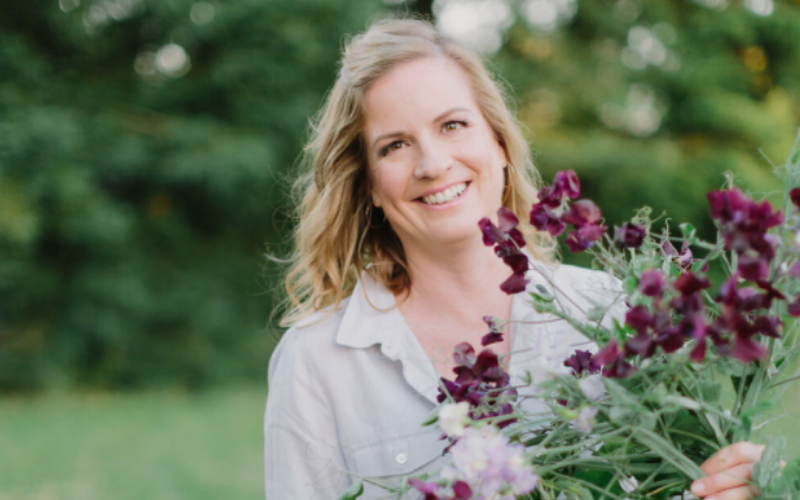
Create awareness with your wholesale sales reps by telling them you are interested in buying American-grown and locally-grown products. And seek out local growers to help differentiate yourself in the marketplace. "It's easy to go to a wholesaler or get shipments of flowers, but you can expand your business by having local blooms that appeal to a client who really values that -- and it doesn't take that much time," she says.
She encourages her peers to be open-minded about doing business in a new way. "In the past year and a half, we've seen that people really want to support their local communities. It's a value I'm starting to see become more important among consumers -- supporting local restaurants and local food farmers. So why wouldn't our clients want to support us buying local flowers and why wouldn't we want to support local flower farms? Now is the perfect time to make a transition."
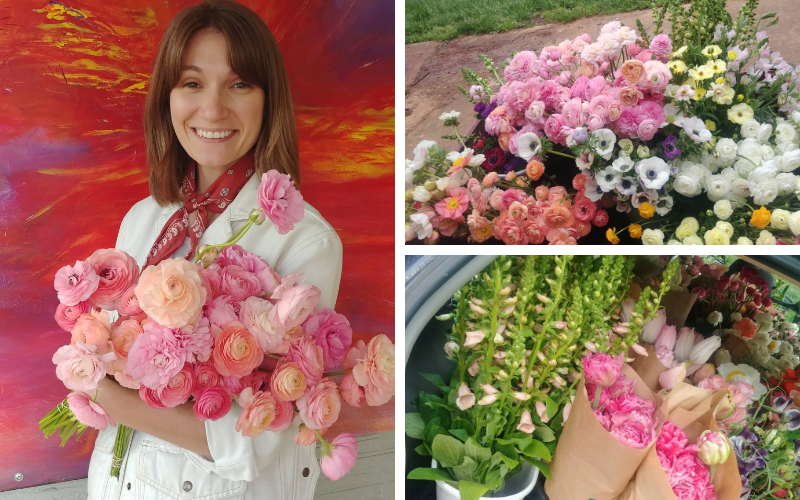
(Pictured Florist: Kate Asire of Kate Asire Flowers)
Melissa Smith's flower farm is based in the SC Upstate Region, just 10 minutes from the North Carolina state line and home to many destination wedding venues. To make it easy for floral designers to buy from Fraylick Farm, Melissa recently developed a separate, password-protected website called Fraylick Wholesale. She typically lists two weeks' upcoming crop availability, which helps regular customers with seasonal planning. Florists pay online when they order. She delivers one day per week to customers in a 40-mile radius, primarily between her farm and Greenville, the largest city to the south. Florists to the north, toward Asheville, N.C., and those who want their order on days she doesn't deliver can also pick up from her farm.
The online tool benefits both farmer and florist, Melissa says. "It gives florists a place to look and see what's available and it has cut out the string of five or six emails or texts that used to happen every Monday!"
It's been important to Melissa to help her florists and their clients understand seasonality, especially because the Southern hot weather affects when certain flowers bloom. "The issue we have is that brides want spring flowers year-round, but in the South, that's not seasonally realistic. I try and post really accurate photos on Instagram to show what is blooming at any specific time."
Wedding and event florists comprise nearly 90 percent of her business, so Melissa is focused on growing unique botanicals varieties they want. "Most of my customers have come to me and I think I hit at the right time in this area when we started six years ago. There were other flower farmers here, but most were sold at farmers' markets. So the florist community was dying for local product."
Most of her florists are also small business owners, so there is a mutual give-and-take. When one well-connected florist in Columbia, S.C., located nearly two hours away, wanted to order Fraylick Farms' flowers, Melissa suggested: "can you help me find more customers in your area?"
She draws from her design and color theory background when choosing what to grow, building relationships with design customers by learning their craft. Early on Melissa interned for an event florist. "That was one of the most eye-opening experiences because I saw how florists work." She continues to freelance for some of her florist customers, "learning how to design, but also learning how my design customers use my flowers."
Melissa's advice:
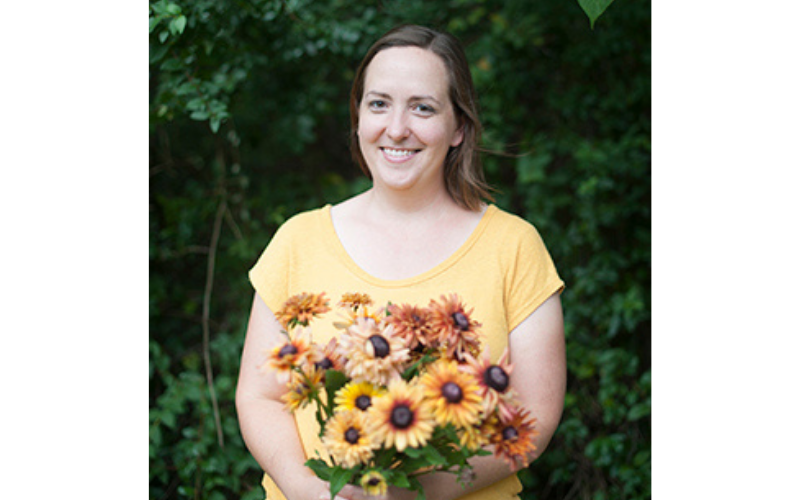
Tell flower farmers what you want them to grow. "Be vocal and tell us what you want!"
Value diversity in your floral choices: "Some florists buy loads of variety. Some buy maybe 10 to 15 different types of flowers for an event, but they buy them in quantity -- 25 to 30 bunches. In general, you'll have better luck buying from local farmers if you can work with more variety in smaller quantities."
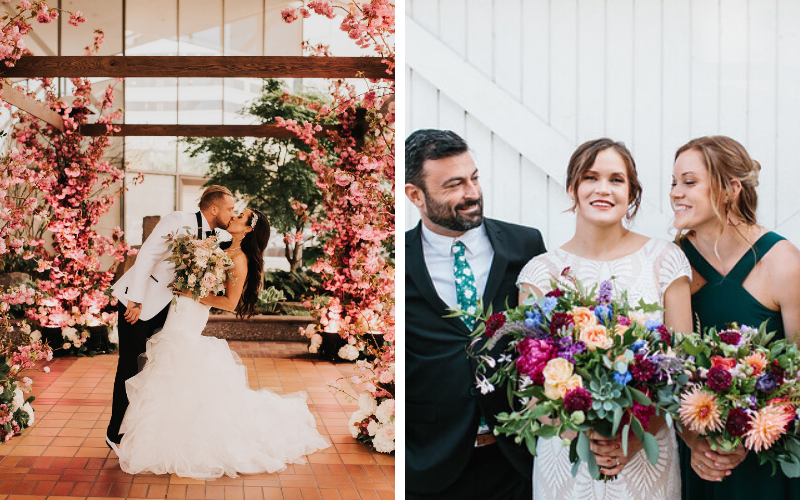
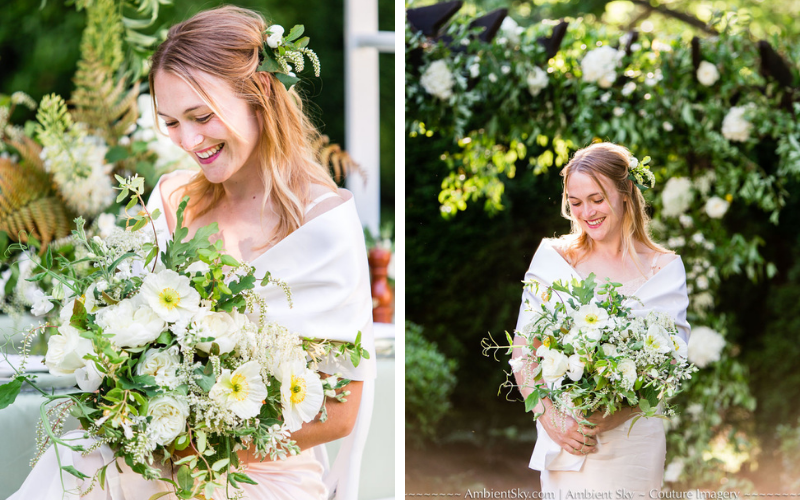
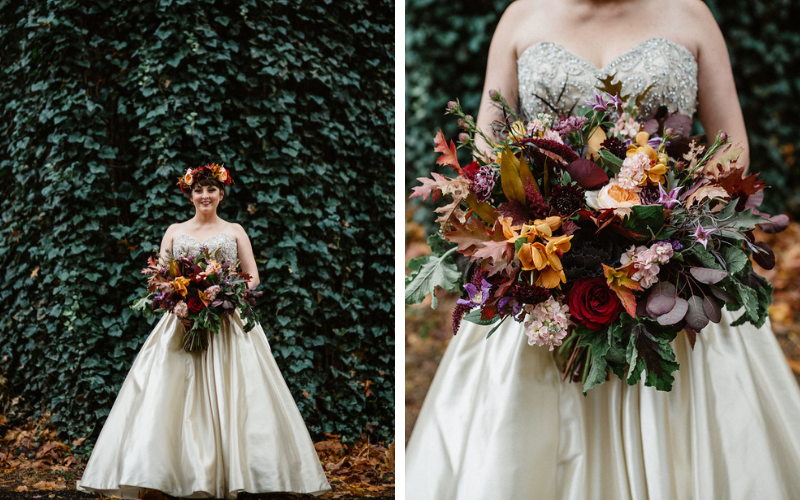
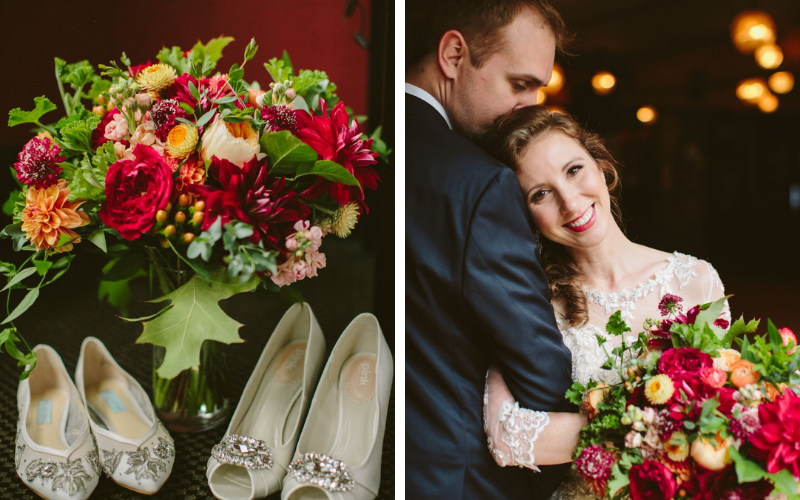 (Photo Credits Top Left to Bottom Right: Bride & Groom by Baylee Dennis Photography, Bride and Bridesmaids by Shelby Bracken Photography, Bride with White Bouquet by Ambient Sky Photography, Bride with Jewel Tone Bouquet by Mark Federighi Photography, Fall Bride & Bouquet by Yasmin Khajavi Photography)
(Photo Credits Top Left to Bottom Right: Bride & Groom by Baylee Dennis Photography, Bride and Bridesmaids by Shelby Bracken Photography, Bride with White Bouquet by Ambient Sky Photography, Bride with Jewel Tone Bouquet by Mark Federighi Photography, Fall Bride & Bouquet by Yasmin Khajavi Photography)
Botanica is a full-service florist specializing in weddings and events, corporate orders, daily deliveries, and since April 2021, a retail floral, home, and gift boutique in Portland's Pearl District.
Founder Josef Reiter draws from a 20-year career performing and touring in Broadway shows, although a few part-time jobs at a greenhouse and garden center when in high school foreshadowed his eventual career as a florist.
Josef lets his wedding clients know that "first and foremost, I try to source locally." He relies on seasonal flowers as design ingredients for the Botanica aesthetic: lush, voluptuous, natural, organic, and garden-inspired.
Supporting flower farms in his area comes naturally, Josef says. "I shop mostly at the Portland Flower Market, where luckily we have all the local growers. For us, it's a blessing because we can do one-stop shopping. I can buy from many different growers (through the Oregon Flower Growers Association) and even the large wholesalers carry local flowers."
Growers also seem to find Botanica, like a farmer named Ed Silver of Cut & Dry Flowers who drives into town and stops at flower shops to sell just-harvested goodies from the back of a truck. "He has a wide variety," Josef laughs. "There's never a ton of anything, but he has beautiful things like the dogwood in the spring, gorgeous peonies, and terrific sunflowers. Right now, he's bringing in fruited blueberry branches. He is an organic grower, which is also nice."
An old-school grower like Ed doesn't necessarily send out an availability list, nor does he operate a website, Josef notes. "I think he just got a cell phone not that long ago, and he doesn't have email." Despite those quirks, Josef is grateful that Botanica is the first stop on Ed's route.
Josef's advice:

When new growers contact Botanica to sell their crops, "I tell them to try and be different," Josef says. "See what other farms are growing and don't grow the same thing. That's one challenge I see. For a while, no one was growing hellebores locally and now we have plenty of them. Or, there will be one farm growing Scabiosa 'Scoop' series and then the next year everyone has it. Right now, we really need field-grown garden roses!"
He encourages florists to educate their customers about seasonality. "I always tell clients, 'If we can't get a specific flower, we'll substitute something similar. And it will be beautiful."
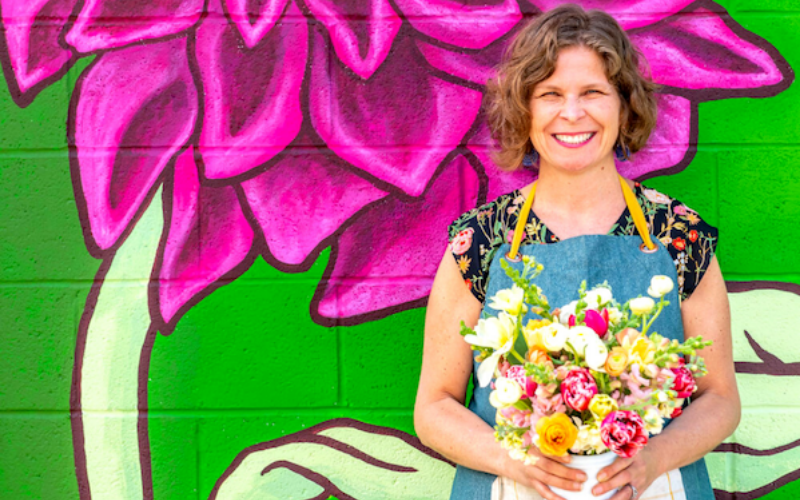
Ellen Frost owns Local Color Flowers, a Baltimore-based studio that exclusively sources local flowers. Ellen founded her company in 2008 as a part-time wedding floral business to provide Baltimore area couples sustainable flower options for their celebrations. Over the past 13 years, Ellen has grown Local Color Flowers into a thriving business by adding floral design classes, corporate events, and subscriptions, as well as creating social and educational community events – all using 100% locally grown flowers.
Over the years, as more florists discovered the benefits of buying locally-grown flowers, they reached out to Ellen for advice. In response, last year she launched an online course called “Growing Your Business with Local Flower Sourcing,” which is geared for florists like her.
One of the questions she's often asked is: "Is this hard to do? How do you find flower growers to buy from?"
"Yes, it's harder in most cases to source locally than it is to just buy from your local wholesaler or even from an online wholesaler because those models are designed to be one-stop shopping," Ellen explains. "So unless you're in an area where there is a cooperative of local growers or some sort of shared selling hub, you are likely not buying that way. You are probably buying directly from one or multiple farmers to fill the need you have."
She has learned over the years that building a brand around local flowers requires consumer education and managing expectations. Yet the benefits far outweigh the challenges, Ellen maintains. "When you are buying local flowers, you are getting the freshest product available, coming directly from where it was harvested. There's no shipping; there's no product out of water; there's no flying it in. It's coming from down the road or the next county over. Not only is it super-fresh, in terms of design, you are getting such a unique product that in many cases you wouldn't find at the wholesaler. Don't we all want those special ingredients that set us apart in the market?
"Rather than showing the same thing on Pinterest or Instagram -- every peony bouquet or every rose bouquet that looks the same -- people who use local floral products more in line with their region also have a story to tell about those flowers."
Ellen believes "the story" helps attract customers. "No designer who is using commodity roses from South America is telling that story. But when you have a story like we do, that says, 'hey, these roses are grown in Baltimore City by the only rose grower in our whole state,' that's how you attract people who keep coming back to hear the story of the next flower, of the next design."
Issues of transportation and delivery often become an impediment as florists begin adopting the local sourcing model, she finds. "The sooner you figure out how to incorporate the time and money (spent sourcing) into your budget, I think the better off you'll be."
Local Color Flowers' situation is similar to a lot of design studios. "We're in an urban, city area and the majority of our flower farmers are located outside the city, as close as 10 minutes away in the neighboring county to out of state -- Virginia or Pennsylvania. A lot of people deliver to us. We do still pick up at some farms and we also share delivery with other florists. So when farmers deliver to us, they will deliver other florists' orders, too." Yes, she's helping a competitor gain access to flowers from the same farm that supplies Local Color Flowers, "but that means there is higher demand, which means the farmers will grow more, and grow different things for all of us."
Ellen's advice:
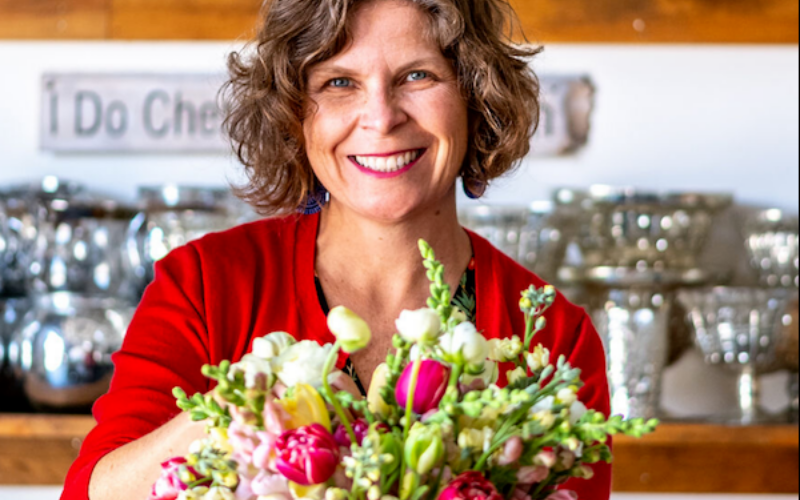
Go to farmers' markets, talk to farmers, talk to the growers you're already buying from. Some farms don't have websites and you hear about them via word of mouth.
Observe proper etiquette. "Don't just show up at a farm unannounced. Ask farmers how they like to sell and how to set up an account with them."
Ellen encourages florists just getting started sourcing locally to begin small with just one order, one event, one crop at a time. "You can ease into it that way," she says. "You don't have to change your whole business at once. Try a hybrid model and evolve over time.
Registration for Ellen's next session of "Growing Your Business with Local Flower Sourcing" takes place November 5-9 and the six-session course begins January 2022. Learn more at https://www.thegardenersworkshop.com/
Follow Details on Instagram!